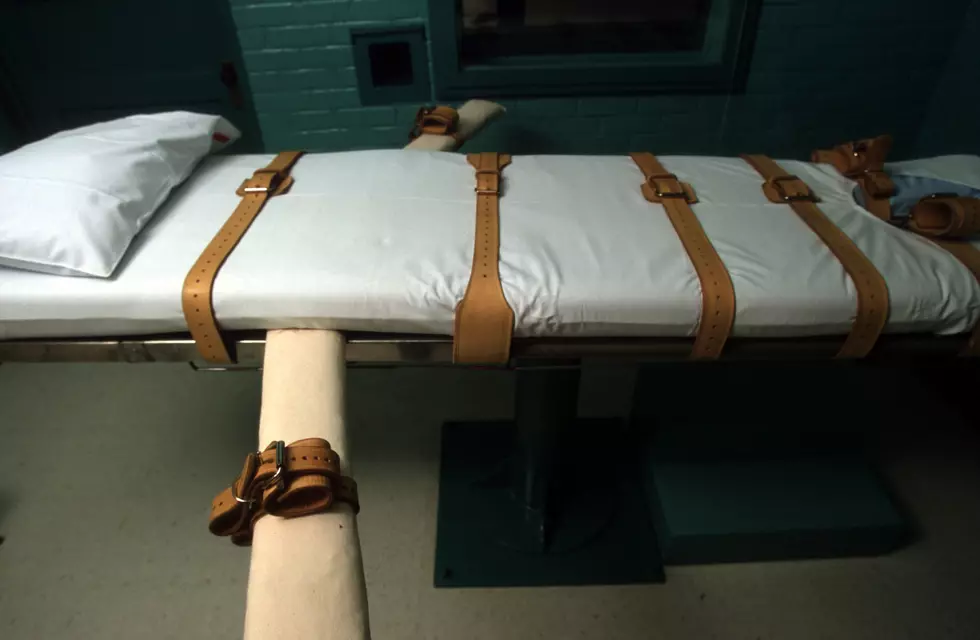
Kevin Johnson Execution To Be Carried Out Today, Parson Says
Governor Mike Parson has confirmed that the State of Missouri will carry out the sentence of Mr. Kevin Johnson on Tuesday, Nov. 29 as ordered by the Supreme Court of Missouri.
"Mr. Johnson has received every protection afforded by the Missouri and United States Constitutions, and Mr. Johnson’s conviction and sentence remain for his horrendous and callous crime. The State of Missouri will carry out Mr. Johnson’s sentence according to the Court's order and deliver justice," Governor Parson said. "The violent murder of any citizen, let alone a Missouri law enforcement officer, should be met only with the fullest punishment state law allows. Through Mr. Johnson's own heinous actions, he stole the life of Sergeant McEntee and left a family grieving, a wife widowed, and children fatherless. Clemency will not be granted," Parson said.
The Missouri Supreme Court on Monday overruled a motion to vacate the death sentence of Johnson, 37, in a 5-2 decision. He is scheduled to die at 6 p.m., this evening by lethal injection at the state prison in Bonne Terre. He would be the second Missouri man put to death in 2022 and the 17th nationally.

The Court convened an emergency hearing on Monday to consider special prosecutor E.E. Keenan's motion to vacate the death sentence.
Johnson’s 19-year-old daughter, Khorry Ramey, had sought to witness her father's execution, but a Missouri law prohibits anyone under the age of 21 from observing the event.
"Mr. Johnson ambushed and shot Sergeant Bill McEntee while he responded to a call in Johnson’s neighborhood. Even though Sergeant McEntee survived the first five shots, Mr. Johnson approached Sergeant McEntee and executed him with two more shots to the head while he was crawling on his hands and knees out of his wrecked squad car. There is not and never has been any doubt about Mr. Johnson’s guilt. Nor has Mr. Johnson’s conviction or sentence ever been reversed on appeal. Mr. Johnson’s case has been reviewed in the state trial court, Missouri Supreme Court, federal district court, Eighth Circuit Court of Appeals, and United States Supreme Court," Parson said in a press release on Monday.
McEntee, 43, was a 20-year veteran of the police department in Kirkwood, a St. Louis suburb. The father of three was among the officers sent to Johnson’s home on July 5, 2005, to serve a warrant for his arrest. Johnson was on probation for assaulting his girlfriend, and police believed he had violated probation.
Johnson saw officers arrive and awoke his 12-year-old brother, Joseph “Bam Bam” Long, who ran to a house next door. Once there, the boy, who suffered from a congenital heart defect, collapsed and began having a seizure.
Johnson testified at trial that McEntee kept his mother from entering the house to aid his brother, who died a short time later at a hospital.
That same evening, McEntee returned to the neighborhood to check on unrelated reports of fireworks being shot off. A court filing from the Missouri attorney general's office said McEntee was in his car questioning three children when Johnson shot him through the open passenger-side window, striking the officer's leg, head and torso. Johnson then got into the car and took McEntee's gun.
The court filing said Johnson walked down the street and told his mother that McEntee “let my brother die” and “needs to see what it feels like to die.” Though she told him, “That's not true,” Johnson returned to the shooting scene and found McEntee alive, on his knees near the patrol car. Johnson shot McEntee in the back and in the head, killing him.
Johnson’s lawyers have previously asked the courts to intervene for other reasons, including a history of mental illness and his age — 19 — at the time of the crime. Courts have increasingly moved away from sentencing teen offenders to death since the Supreme Court in 2005 banned the execution of offenders who were younger than 18 at the time of their crime.
But a broader focus of appeals has been on alleged racial bias. In October, St. Louis Circuit Judge Mary Elizabeth Ott appointed a special prosecutor to review the case. The special prosecutor, E.E. Keenan, filed a motion earlier this month to vacate the death sentence, stating that race played a “decisive factor” in the death sentence.
Ott declined to set aside the death penalty.
Keenan told the state Supreme Court that former St. Louis County Prosecutor Bob McCulloch’s office handled five cases involving the deaths of police officers during his 28 years in office. McCulloch sought the death penalty in the four cases involving Black defendants, but did not seek death in the one case where the defendant was white, the file said.
Assistant Attorney General Andrew Crane responded that “a fair jury determined he deserves the death penalty.”
McCulloch does not have a listed phone number and could not be reached for comment.
Johnson's 19-year-old daughter, Khorry Ramey, had sought to witness the execution, but a state law prohibits anyone under 21 from observing the process. Courts have declined to step in on Ramey's behalf.
The U.S. saw 98 executions in 1999 but the number has dropped dramatically in recent years. Missouri already has two scheduled for early 2023. Convicted killer Scott McLaughlin is scheduled to die on Jan. 3, and convicted killer Leonard Taylor’s execution is set for Feb. 7.
LOOK: Here are the biggest HBCUs in America
More From AM 1050 KSIS









